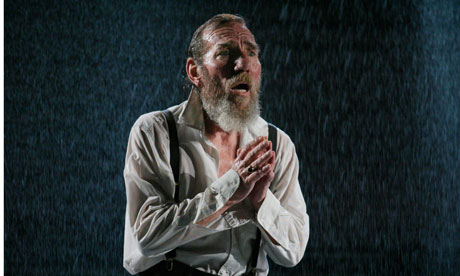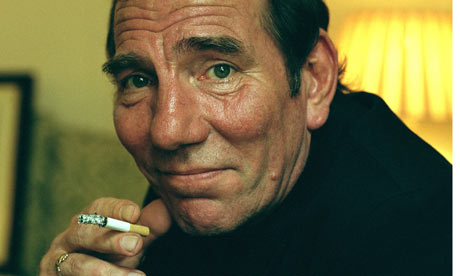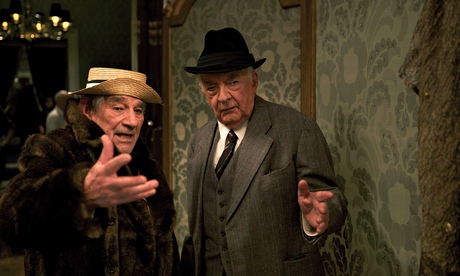The actor Pete Postlethwaite had a face that elicited many similes, among them "a stone archway" and "a bag of spanners". These unflattering descriptions, plus his tongue-twisting surname, would suggest an actor with a career limited to minor supporting roles. But Postlethwaite, who has died of cancer aged 64, played a vast range of characters, often leading roles, on stage, television and film.
He was at ease in switching the masks of tragedy and comedy. The working-class martinet father he played in Terence Davies's film Distant Voices, Still Lives (1988), which Postlethwaite credited as his big break, can be seen as paradigmatic of his career. Postlethwaite powerfully conveyed the father's double-sided nature: at one moment he is tenderly kissing his children goodnight, the next he is ripping the tablecloth off in a rage.
Postlethwaite was Oscar-nominated as best supporting actor for his performance in Jim Sheridan's In the Name of the Father (1993). He portrayed Patrick "Guiseppe" Conlon, one of the Maguire Seven, who in 1976 was sentenced to 12 years in prison for possessing nitroglycerine to be used for IRA bombs. Guiseppe died in prison in 1980; his conviction was overturned 11 years later.
His son Gerry, portrayed in the film by Daniel Day-Lewis, was one of the Guildford Four, wrongly imprisoned for IRA attacks on pubs in 1974. Postlethwaite portrayed Guiseppe as a proud man, convinced of his moral rectitude, with all of the Troubles of Northern Ireland in his agonised face. He said that he based the character on his own father, a barrel-maker and a school caretaker, whom he described as "an extraordinary man ... simple, unaffected, sweet, straightforward".
Postlethwaite was born in Warrington, Cheshire, the youngest child of Bill and Mary Postlethwaite. He studied to become a teacher at St Mary's University College in Twickenham. "I thought, 'You can't possibly be an actor, somebody from Warrington. It's not what you do.' So I thought I'd go and teach for a couple of years, and if at the end of that time I still wanted to act then I'd do it."
He took a job in a sheet-metal factory to pay his way through Bristol Old Vic theatre school, before starting his career at the Liverpool Everyman theatre. From 1975, Postlethwaite began to get roles in films and on television, but it took more than 10 years for audiences to begin to put a name to that face. He had a recurring role in the TV series Horse in the House (1979), played the butcher in the British comedy film A Private Function (1984) and appeared in the play within the play in Franco Zeffirelli's film of Hamlet (1990). By then, he was in demand on both sides of the Atlantic, though he mostly refrained from Americanising his accent. He was among the British contingent in Alien 3 (1992) and was a British captain in The Last of the Mohicans (1992), also starring Day-Lewis. He lent a slight, unplaceable foreign accent to his soft-spoken sinister enforcer, Kobayashi, in Bryan Singer's inscrutable The Usual Suspects (1995).
He was nominated for a Bafta for his performance on TV as the wily Montague Tigg in the BBC's splendid Martin Chuzzlewit (1994). Having appeared opposite Sean Bean in the TV films Sharpe's Company and Sharpe's Enemy (both 1994), he was reunited with Bean in the sporting drama When Saturday Comes (1996), playing a football manager. In 1996, his Friar Laurence brought some much-needed classicism to the revisionist pop proceedings in Baz Luhrmann's Romeo + Juliet.
He was perhaps more at home as Danny, the leader of the Yorkshire colliery brass band, in Mark Herman's Ealing-esque comedy Brassed Off (1996). In the following year, continuing to show his versatility, Postlethwaite made two films for Steven Spielberg, The Lost World: Jurassic Park, in which he hunted the biggest game imaginable (a T-Rex) and the well-meaning abolitionist drama Amistad, as a pro-slavery prosecutor. Spielberg said that Postlethwaite was "the best actor in the world". Postlethwaite joked: "I'm sure what Spielberg actually said was, 'The thing about Pete is that he thinks he's the best actor in the world'."
He returned to British TV with prominent roles in the crime series The Sins (2000) and Criminal Justice (2008); and took small parts in the films The Shipping News (2001) and The Constant Gardener (2005). He was appointed OBE in 2004. In recent years, he had been cast in three remakes, Dark Water (2005), as the superintendent of a haunted building; The Omen (2006), as an apocalyptic priest, and Clash of the Titans (2010), in which he was seen in 3D. Last year he also appeared in Ben Affleck's crime drama The Town and Christopher Nolan's thriller Inception.
In 2009, Postlethwaite made a documentary, The Age of Stupid, on climate change, a subject he felt passionately about. In the film, he plays the last man alive. Postlethwaite, a political activist who practised what he preached, lived in Shropshire with his wife, Jacqui, in an eco-house complete with wind turbine and solar panelling. When asked last year by the Guardian when he was happiest, he replied: "Last Sunday night in front of the fire, watching Mamma Mia! with Jax and our children, Will and Lily." His wife and children survive him.
Michael Coveney writes: After training at the Bristol Old Vic school, Peter Postlethwaite (as he was known for the first decade of his career) joined the Liverpool Everyman under the direction of John McGrath and then Alan Dossor. That period in the mid-1970s still shines like a distant beacon of engaged repertory theatre, producing new plays of local interest – by McGrath, CG Bond, Willy Russell, Alan Bleasdale, Mike Stott – with a crack troupe of brilliant new actors.
Dossor had been a fine actor himself; he had an eye for new and socially committed talent. Postlethwaite stood out, first among equals, in such good company: Julie Walters, Alison Steadman, Kate Fahy, Jonathan Pryce, Nick Stringer, Bill Nighy, Antony Sher, Trevor Eve, Bernard Hill. Of course, he was always described as potato-faced, bloke-ish, searingly truthful and blissfully funny. But he had an edge, an ambiguity, and a gleaming maniacal quality, too.
In 1975 he played the lead in Bertolt Brecht's version of Coriolanus in a Japanese-style production, transmitting a most unusual and appealing naivety as "this thing of war" and flying at the peasants in a boiling, eye-popping rage; the heat of a battle was his sole, animating incentive.
You could not imagine anyone else playing the hen-pecked Syd in Russell's Breezeblock Park or the obstreperous salesman in Stott's Funny Peculiar. Both were wonderful, affectionate portraits of suburban flummery. In the latter, a farce about fellatio in the Pennines, Postlethwaite engaged with Richard Beckinsale in a slapstick battle of cream puffs.
He forged a significant relationship with the director Adrian Noble at the Bristol Old Vic in Titus Andronicus (1978), playing the villainous and tragically bereaved Aaron. He was a superb Antonio in Noble's unforgettable The Duchess of Malfi (Helen Mirren, Bob Hoskins as Bosola) at the Royal Exchange in Manchester in 1981; instead of the usual dry old stick, he found new notes of decency and bubbling ambition in the steward-turned-lover role.
As Noble established himself at the Royal Shakespeare Company, Postlethwaite joined the company for five or six seasons, playing Cornwall to Michael Gambon's King Lear, Exeter to Kenneth Branagh's Henry V (both directed by Noble) and Hastings to Sher's Richard III (directed by Bill Alexander), as well as Banquo to Bob Peck's Macbeth. Every RSC director, you felt, wanted his name on the team sheet. He was the perfect Ragueneau, the baker, in Derek Jacobi's glorious Cyrano de Bergerac, directed by Terry Hands, and he moved closer to centre stage as Bottom in Alexander's beautiful art deco-into-Narnia A Midsummer Night's Dream.
And when Trevor Nunn opened the Swan in 1986, Postlethwaite was on hand to provide classic, rumbustious knockabout first as Captain Bobadil in a revival of Every Man in His Humour (he played the role in a permanent state of helpless recovery from a hopeless hangover), and then as the loudmouth, rapacious Roughman in Nunn's version of Thomas Heywood's Fair Maid of the West.
But he had to leave the company to play the leads, giving a bloodcurdlingly haunted Macbeth back at Bristol Old Vic for his old Liverpool mucker, George Costigan, in 1997, and a bewitching, valedictory Prospero for Greg Hersov in The Tempest at the Royal Exchange in Manchester 10 years later. At the National in 1992 he was in Sam Mendes's production of Jim Cartwright's The Rise and Fall of Little Voice. He played the sleazy talent agent Ray Say, far seedier than Michael Caine in the film version.
A highly successful collaboration with the director Rupert Goold on Justin Butcher's Scaramouche Jones – as a dying clown reliving his colourful life as a last gasp over 90 minutes – led to his stage apotheosis as King Lear on the Liverpool Everyman stage where his career had begun. This was to mark Liverpool's year, in 2008, as European capital of culture.
The performance received mixed reviews but the critically abhorred gimmicks seemed perfectly reasonable by the time the show fetched up at the Young Vic in London. Rather like Jacobi – and here all comparisons end – Postlethwaite went down the route of splenetic crustiness rather than tyrannical grandeur.
The court greeted him in party hats with a chorus of For He's a Jolly Good Fellow and he sang snatches of My Way. The spirit of the Everyman was abroad. But the tragedy thickened, bristling with intelligent ideas and wonderful staging; and Postlethwaite was, in the end, deeply touching in a housecoat and granny glasses, left out on the heath like some endangered relic from an old folks' home, cracked with madness, moving cheerlessly towards the inevitable.
Nick Hamm writes: Pete always called it the way it was. He punctured pretentiousness and established a level of truth in his work as an actor. Woe betide the director who hadn't done his homework or was trying to put one over on him. Pete became the shop steward of many a company. He represented the actors' interests, both in the rehearsal room and out of it. In a business where words so often lose their meaning – where hyperbole is the norm – he was the real deal; a genuinely honest, decent man who loved his friends and family with a passion I've rarely encountered.
We worked for many years together in the theatre, but it was in film where Pete really found public recognition. He demanded to be watched. I was privileged to have him star in my film Killing Bono. He had wanted to be part of the project, but before we started shooting he told me that he was ill with cancer. We talked and it became clear that even though he was undergoing chemotherapy he still wanted to be part of the story. More than that, he wanted the discipline and motivation of work, so we gave it to him. We couldn't insure him in the role he was originally meant to play so we wrote another for him.
The date arrived and Pete duly turned up on set in Belfast. He wouldn't let anyone make a fuss – he was stoic and brilliant in his wish to be ordinary. We moved his caravan next to the set and filmed him in short bursts. He was shaking with the cold and the effects of the chemo, but he wanted to carry on. He was professional and astonishing until the end.
• Peter William Postlethwaite, actor, born 16 February 1946; died 2 January 2011










